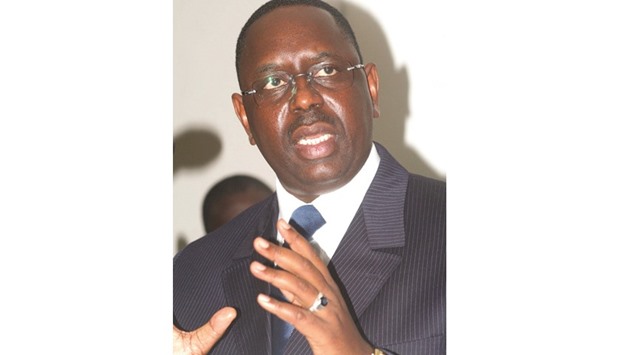Senegal’s President Macky Sall sees a link between climate change and security, in particular when it comes to the militant threat in the Sahel.
“Global warming exacerbates receding water levels... and when water becomes scarce there are fewer agricultural lands and conflict begins,” Sall told AFP in an interview after signing the Paris climate deal at the UN.
“In the Sahel, terrorist groups are swarming and they occupy living spaces around Lake Chad and the Niger river, so we see the interaction between climate, security and terrorism. Everything is truly linked.”
Nigeria’s Islamist Boko Harm is active in the Lake Chad region, which is facing an ecological disaster from vanishing waters.
“Water is a life source, an opportunity for development and partnership, but if we are not careful, water can be a source of conflict and instability,” Sall said.
Sall on Friday chaired a special Security Council meeting on water and security, attended by some 20 countries that are equally concerned by the link between access to resources and security.
After joining more than 170 countries to sign the Paris climate accord, Sall welcomed an “excellent start for the agreement and for humanity.”
Like many other leaders at the UN ceremony, the Senegalese president called for quick ratification and said his country will do so by June to send a message that developing countries must be ready to help poorer nations foot the bill.
Sall expressed hope that financial support for clean electrical power for Africa will finally materialise.
“There are reasons to hope that this time around we will overcome the very long and inefficient procedures and manage to uphold commitments,” said Sall.
More than 600mn Africans do not have access to electricity and the Paris agreement provides for a green fund of $100bn per year from 2020 to help poorer nations make the shift to clean energy.
The Senegalese leader defended his country’s decision to take in two Libyan inmates from the US Guantanamo prison.
Sall said this would help President Barack Obama fulfil his pledge to shut down Guantanamo, a prison “that shocks our conscience.”
“We took them in because they are Africans and they are Muslims, for humanitarian reasons,” he said.
Senegal however took some time to review the cases, pouring over details for a year before making a decision.
The two Libyans were transferred to Senegal in early April.
There are now fewer than 90 inmates at Guantanamo, which once held up to 800 prisoners, many without trial.
Senegal is one of 26 countries worldwide that have taken in nearly 100 former Guantanamo inmates.

Sall ... it’s all about resources.
